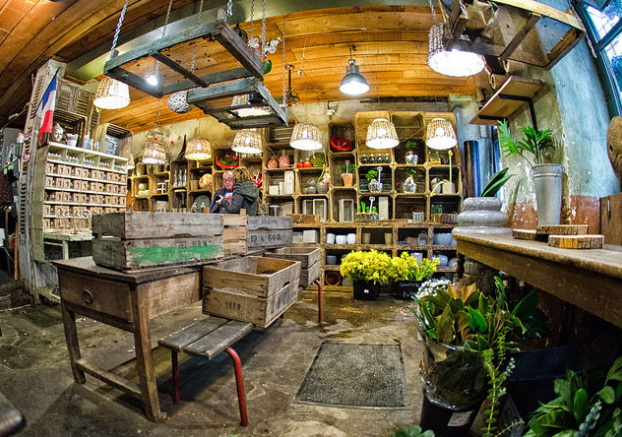Shuji Kawashima stood at the door of his Tokyo flower shop, bowing at a three-quarter angle with sharp, reflexive motions to a female customer who returned the gesture. She backed out into the street, clutching a sheaf of flowers wrapped in heavy cellophane. Kawashima reentered the shop, edged his way past a workbench, and ducked behind an impromptu counter. Peering out from behind a row of tall vases topped with multi-colored roses, he reached for a wine bottle and began pouring drinks.
Gardena, Kawashima’s “flower bar” in the Shimokitazawa neighborhood, is regarded by admiring patrons as unique among the city’s thousands of drinking establishments. The name comes from the Southern California town that evokes for Kawashima all things floral, and where several of his relatives have settled. A “hana-ya” (florist’s) by day that doubles as a bar at night, Gardena is a mini-experiment in combining horticulture and viticulture.
Kawashima, an ebullient 44 years old, wears an open black shirt and jeans, his hair short and spiky with a day or two of stubble on his chin. He looks like a fashion photographer or the editor of a laddy magazine, but the green thumb is real. “I ran a flower shop for almost 20 years in Yokohama,” Kawashima said, “but I always wanted to make something of the place after hours. It’s a waste of space, really, and I love wine. The air in a florist’s is thick—perfumed. My dream was to open up this special atmosphere to others.”
After years of looking for the right spot, he settled on a street slanting away from the train station in a shabbily genteel neighborhood on Tokyo’s West side. The shop holds only eight people at the counter, their backs to the storefront; when the seats fill up, patrons cluster behind the barstools and in the entrance. Gardena, like so many of Tokyo’s miniscule boutiques and bars, excels in converting small size into charm, physical proximity into intimacy. Plants and flowers line the walls and overflow the windowsills and bar top. The lushness of the greenery creates an impression vaguely edenic: the original urban jungle.
Kawashima exudes pleasure at having successfully combined his passions for flowers and wine. But the demands of being a florist and a bar owner weigh heavily on him. “The hours are brutal—up at 6:30 in the morning to go to the central flower market, then I’m in the bar until everyone leaves at midnight or 1 a.m.” For the moment, the bar is open only four nights a week, and he tries to schedule his early morning buying trips to follow evenings off. He is auditioning another bartender for Thursdays.
Like plants entwining their stems as they bend toward the sun, Gardena’s regulars come to mingle with friends, and to be warmed by Kawashima’s personality. He welcomes customers with friendly greetings and exaggerated expressions of interest in their recent doings. His words frequently trail off into a giddy, staccato laughter as his girlfriend Rika, a part-time actress, smoothes introductions among first-time patrons and sets out small plates of nuts to accompany glasses of wine.
The tiny bar divides itself into even smaller eddies of conversation. A software engineer and his much younger Chinese girlfriend tell of their recent trip to Italy. An American MIT graduate now working in Starbucks’ Tokyo corporate headquarters describes how she and her Japanese husband met around the corner many years ago. A pin-up model (star of “Juicy Dynamite,” among other straight-to-video gems), sporting a 103-centimeter bust rarely found in Japan, oozes through a conversation with Kawashima and mockingly cups her prize assets.
Periodically, a customer peers in, almost apologetically, to buy flowers from Kawashima. He scurries to the door; money is handed over in exchange for flowers. The patrons look up from their drinks, amused by the intrusion of commerce. It is pleasing, while drinking, to be confronted with others who are merely buying and selling. The flower bar buffers its visitors from quotidian reality, trapping festive spirits like a greenhouse absorbing moist air.
One night there was talk at Gardena that another “flower bar” might exist in Milan. A photo was produced and debated. But no one really cared. Garlanded in novelty and good cheer, Kawashima-san’s tiny establishment had won over those who stepped inside it, and they didn’t want to go anywhere else.




